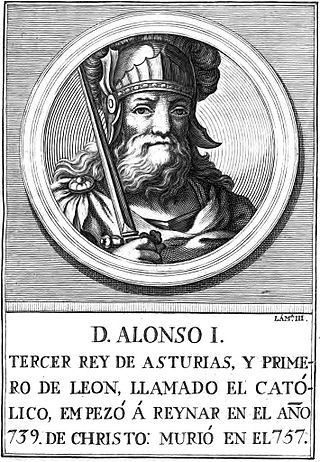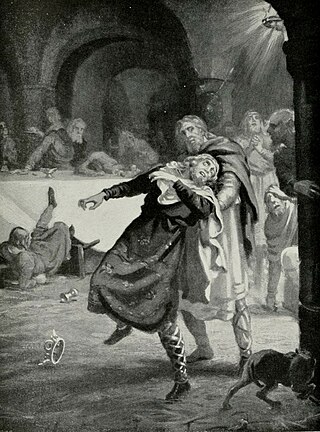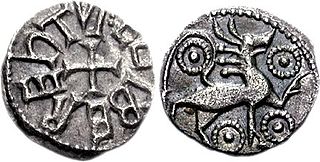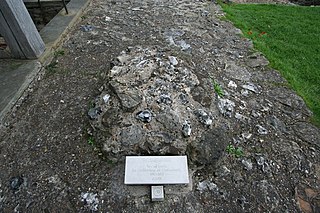Contents
| Other centuries |
| 7th century | 8th century | 9th century |
Events from the 8th century in England .
| Other centuries |
| 7th century | 8th century | 9th century |
Events from the 8th century in England .
The 790s decade ran from January 1, 790, to December 31, 799.
The 690s decade ran from January 1, 690, to December 31, 699.

Year 740 (DCCXL) was a leap year starting on Friday of the Julian calendar, the 740th year of the Common Era (CE) and Anno Domini (AD) designations, the 740th year of the 1st millennium, the 40th year of the 8th century, and the 1st year of the 740s decade. The denomination 740 for this year has been used since the early medieval period, when the Anno Domini calendar era became the prevalent method in Europe for naming years.

Mercia was one of the three main Anglic kingdoms founded after Sub-Roman Britain was settled by Anglo-Saxons in an era called the Heptarchy. It was centred on the River Trent and its tributaries, in a region now known as the Midlands of England.

Offa was King of Mercia, a kingdom of Anglo-Saxon England, from 757 until his death. The son of Thingfrith and a descendant of Eowa, Offa came to the throne after a period of civil war following the assassination of Æthelbald. Offa defeated the other claimant, Beornred. In the early years of Offa's reign, it is likely that he consolidated his control of Midland peoples such as the Hwicce and the Magonsæte. Taking advantage of instability in the kingdom of Kent to establish himself as overlord, Offa also controlled Sussex by 771, though his authority did not remain unchallenged in either territory. In the 780s he extended Mercian Supremacy over most of southern England, allying with Beorhtric of Wessex, who married Offa's daughter Eadburh, and regained complete control of the southeast. He also became the overlord of East Anglia and had King Æthelberht II of East Anglia beheaded in 794, perhaps for rebelling against him.

Ecgberht, also spelled Egbert, Ecgbert, Ecgbriht, Ecgbeorht, and Ecbert, was King of Wessex from 802 until his death in 839. His father was King Ealhmund of Kent. In the 780s, Ecgberht was forced into exile to Charlemagne's court in the Frankish Empire by the kings Offa of Mercia and Beorhtric of Wessex, but on Beorhtric's death in 802, Ecgberht returned and took the throne.

Æthelbald was the King of Mercia, in what is now the English Midlands from 716 until he was killed in 757. Æthelbald was the son of Alweo and thus a grandson of King Eowa. Æthelbald came to the throne after the death of his cousin, King Ceolred, who had driven him into exile. During his long reign, Mercia became the dominant kingdom of the Anglo-Saxons, and recovered the position of pre-eminence it had enjoyed during the strong reigns of Mercian kings Penda and Wulfhere between about 628 and 675.

Æthelred was king of Mercia from 675 until 704. He was the son of Penda of Mercia and came to the throne in 675, when his brother, Wulfhere of Mercia, died from an illness. Within a year of his accession he invaded Kent, where his armies destroyed the city of Rochester. In 679 he defeated his brother-in-law, Ecgfrith of Northumbria, at the Battle of the Trent: the battle was a major setback for the Northumbrians, and effectively ended their military involvement in English affairs south of the Humber. It also permanently returned the Kingdom of Lindsey to Mercia's possession. However, Æthelred was unable to re-establish his predecessors' domination of southern Britain.

Coenwulf was the King of Mercia from December 796 until his death in 821. He was a descendant of King Pybba, who ruled Mercia in the early 7th century. He succeeded Ecgfrith, the son of Offa; Ecgfrith only reigned for five months, and Coenwulf ascended the throne in the same year that Offa died. In the early years of Coenwulf's reign he had to deal with a revolt in Kent, which had been under Offa's control. Eadberht Præn returned from exile in Francia to claim the Kentish throne, and Coenwulf was forced to wait for papal support before he could intervene. When Pope Leo III agreed to anathematise Eadberht, Coenwulf invaded and retook the kingdom; Eadberht was taken prisoner, was blinded, and had his hands cut off. Coenwulf also appears to have lost control of the kingdom of East Anglia during the early part of his reign, as an independent coinage appears under King Eadwald. Coenwulf's coinage reappears in 805, indicating that the kingdom was again under Mercian control. Several campaigns of Coenwulf's against the Welsh are recorded, but only one conflict with Northumbria, in 801, though it is likely that Coenwulf continued to support the opponents of the Northumbrian king Eardwulf.
Coenred was king of Mercia from 704 to 709. Mercia was an Anglo-Saxon kingdom in the English Midlands. He was a son of the Mercian king Wulfhere, whose brother Æthelred succeeded to the throne in 675 on Wulfhere's death. In 704, Æthelred abdicated in favour of Coenred to become a monk.

Ceolred was king of Mercia from 709 to 716.
Cuthred or Cuþræd was the King of Wessex from 740 until 756. He succeeded Æthelheard, his relative and possibly his brother.

Eadberht was king of Northumbria from 737 or 738 to 758. He was the brother of Ecgbert, Archbishop of York. His reign is seen as a return to the imperial ambitions of seventh-century Northumbria and may represent a period of economic prosperity. He faced internal opposition from rival dynasties and at least two actual or potential rivals were killed during his reign. In 758 he abdicated in favour of his son Oswulf and became a monk at York.

Alhred or Alchred was king of Northumbria from 765 to 774. He had married Osgifu, either the daughter of Oswulf, granddaughter of Eadberht Eating, or Eadberht's daughter, and was thus related by marriage to Ecgbert, Archbishop of York. A genealogy survives which makes Alhred a descendant of Ida of Bernicia through a son named Eadric.

Æthelred, was the king of Northumbria from 774 to 779 and again from 790 until he was murdered in 796. He was the son of Æthelwald Moll and Æthelthryth and possibly became king while still a child after Alhred was deposed.

Ælfwald I was king of Northumbria from 779 to 788. He is thought to have been a son of Oswulf, and thus a grandson of Eadberht Eating.
Eardwulf was king of Northumbria from 796 to 806, when he was deposed and went into exile. He may have had a second reign from 808 until perhaps 811 or 830. Northumbria in the last years of the eighth century was the scene of dynastic strife between several noble families: in 790, king Æthelred I attempted to have Eardwulf assassinated. Eardwulf's survival may have been viewed as a sign of divine favour. A group of nobles conspired to assassinate Æthelred in April 796 and he was succeeded by Osbald: Osbald's reign lasted only twenty-seven days before he was deposed and Eardwulf became king on 14 May 796.
Events from the 10th century in the Kingdom of England.
Events from the 9th century in England.

Events from the 7th century in England.